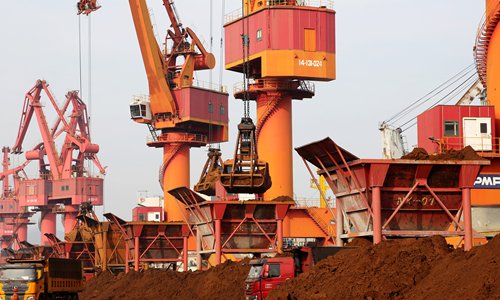
Cranes unload imported iron ore at the Lianyungang Port in East China’s Jiangsu Province on Sunday. In September, the port’s iron ore throughput exceeded 6.5 million tons, a new high for the year, making it a major port for iron ore imports in China. Photo: VCG
China's iron ore imports remained strong from January to April with import volumes increasing by 6.7 percent, bolstered by resilient demand after the resumption of production, pushing up the price significantly (58.8 percent) to 1,009.7 yuan ($156.3) per ton, remaining at a high level. Meanwhile, the average price for imported iron ore in April alone reached $164.4, the highest since November 2011, data with Beijing Lange Steel Information Research Center shows.
While China's demand for iron ore plays an important role in the increase in the volume and price of imported iron ore, experts said that the high price is likely to be eased with the diversification of the sources of supplies and transformation toward green energy.
The jump on raw material price took place since last year, ignited by the growth of steel production after the epidemic was well contained in China. From statistical data, in the first quarter, China's output of pig iron and crude steel output reached 220.97 million tons and 271.04 million tons, year-on-year growth of 8.0 and 15.6 percent, respectively.
Due to resilient demand, the average price of iron ore imports in April was 164.4 dollars per ton, up 84.1 percent year-on-year, according to the calculation of Beijing Lange Steel Information Research Center.
Meanwhile, other factors such as capital speculation and high concentration of global supplies also added fuel to the soaring price, escalating the cost pressure of the domestic iron and steel industry, experts said.
More than 80 percent of China's iron ore imports are concentrated in the hands of four major foreign miners, with Australia and Brazil accounting for a combined 81 percent of China's total iron ore imports, according to media reports.
Among them, Australia takes over 60 percent of the total amount of iron ore imports. Although they dropped by 7.51 percentage points from 2019 after the Chinese steel industry's efforts to diversify in the sources of supplies, they have remained in a dominant position.
However, experts believe that the price jumping trend is likely to be weakened with the changing industrial structure in China, the world’s largest consuming market for iron ore.
China scrapped tariffs on certain steel products and raw materials starting on May 1, as part of efforts to curb iron ore consumption amid skyrocketing prices.
The new policy, together with accelerated efforts of exploitation of mines both at home and abroad, will help effectively reduce the amount of imported iron ore and tame the high prices, Ge Xin, an industry expert, told the Global Times.
But with remaining uncertainties, experts believe that price easing would be a long-term process.
Under the suspension of the dialogue mechanism between China and Australia, superposition of global inflation, as well as overseas demand expansion under the rise in steel prices, the future price of iron ore will encounter more uncertainties, Wang Guoqing, research director at the Beijing Lange Steel Information Research Center, told the Global Times on Friday, indicating that the high price would not be eased in the short term.
